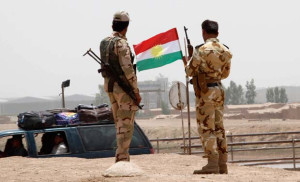Peshmergas continue to fight ISIS
 While the Kurdistan Regional Government (KRG) turns its attention to political aspirations for independence, the Peshmerga’s fight against the Islamic State of Iraq and Sham (ISIS), or now just the Islamic State (IS), continues. With the declaration of a Caliphate and Abu Bakr al-Baghdadi, at the realm as the Caliph, it appears that ISIS has no intention of retreating and the battle for Baghdad and greater dominance in Iraq will persist.
While the Kurdistan Regional Government (KRG) turns its attention to political aspirations for independence, the Peshmerga’s fight against the Islamic State of Iraq and Sham (ISIS), or now just the Islamic State (IS), continues. With the declaration of a Caliphate and Abu Bakr al-Baghdadi, at the realm as the Caliph, it appears that ISIS has no intention of retreating and the battle for Baghdad and greater dominance in Iraq will persist.
A source within the KRG Security Forces (who will be referred to as X to preserve his anonymity) conceded that whilst the Peshmerga are doing their utmost in the fight, they lack the resources and are under-equipped to fight the Islamic fundamentalists, who after the desertion of the Iraqi army were able to seize for themselves US weapons in abundance. “The Peshmerga are a conventional fighting force designed to fight conventional militaries not urban warfare, we are losing Peshmerga because of this.” He added that the Counter Terrorism forces are the only ones trained to deal with the insurgents but their numbers have them stretched thin in the battle.
The Peshmerga’s fight with ISIS has intensified in Jalola, Diyala and Kirkuk. The Kurdish forces continue to protect the areas under their control but admit that it is difficult to do so as ISIS is now hiding amongst the locals making identification of the insurgents a much more complex task. “They are better equipped than the Peshmerga and we have not received help from anyone. The West needs to step in and assist us because this war doesn’t look like it will end anytime soon.”
The Kurds seem to be engaged on the battlefield as well as the political arena especially when it comes to oil rich Kirkuk. Kurdish control of Kirkuk has led to Arab criticism about the KRG’s intention of using the opportunity to annex the city to the Kurdistan Region. Whilst the Kurds contest and deny such claims, X states that they “won’t give up any areas, especially Kirkuk.” Many Kurds felt cheated when in 2003 the US forced their arm in relinquishing their control of the city. But it would seem this time it is different, they have no intention of putting Kirkuk under the governance of an Iraqi government that is falling apart.
And Iraq is falling apart. The KRG has lost hope in maintaining a relationship with Baghdad to keep it a unified country. The 2003 war did liberate the country from a dictator but in its place a new one emerged and there are no guarantees that Maliki’s departure won’t allow for another iron fist premier. The sectarian war that raged did so without any contribution from the Kurds and simply broken down, the Shias will always feel entitled to the lion’s share of power in Baghdad as the majority and the Sunnis will always feel marginalized. This is not a war for the Kurds to be dragged into but they need to be cautious and alert. ISIS’ focus at the moment is on overthrowing Baghdad but as X points out “the only reason they don’t attack us full on is because they don’t want a war on two fronts, otherwise they are a real and imminent threat to Kurdistan.”
The fight, as it stands, is concentrated in Syria and Iraq but as X points out, the vision of ISIS extends beyond those territories. “They have every intention of taking the fight to Europe as this would be a major media coup for them and would act as a trigger for more recruits to come from Europe and USA to join ISIS. There are many sympathizers in Europe who would be emboldened and encouraged to give more support to ISIS if they manage to carry out attacks in Europe.”
“They are a very direct and imminent threat to Europe. The numbers of foreign fighters from Europe has increased greatly and this is unlike Afghanistan or Iraq from 2003 as far as European recruitment.” The international community cannot allow ISIS to wreak the same havoc in Iraq as it has done in Syria. The US has a greater vested interest in Iraq but in what form their intervention will come, if it comes, remains to be seen. In the meantime however, the KRG security forces continue to counter ISIS’ onslaughts but how long they can keep them at bay is becoming worrisome.
Comments
The American populace is with you… despite the failings of our government anyone with a brain over on our side of the ocean knows the Kurds are fighting for what is right.